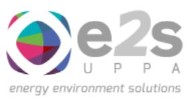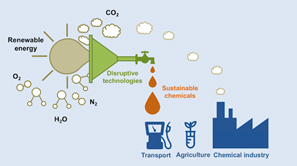InterMatInterface Matters in Solution Processed Inorganic/Organic Thin Film Solar Cells for Bio-inspired Solar Fuels Generation
International Chair E2S UPPA / ICREA
27/05/19 – 31/05/24
The project
InterMat aims to approach solar cells and novel catalysts to their uses in CO2 conversion photo-electrocatalytic systems to mimic photosynthesis. On the one hand, it will focus on the investigation of the interface between the nanoscale semiconductor layers, deposited using solution processed techniques, in these thin film solar cells to reduce non-radiate charge recombination processes and maximize the solar cell efficiency. Furthermore, it will study the photo-electrocatalytic reactions at the surface of the organic or inorganic nano/micro-structured semiconductor electrodes used in the photo-reactor for the reduction of CO2 into solar fuels.
How materials work-function changes, the interfacial charge transfer reactions that limits the devices theoretical maximum efficiency for CO2 conversion, the mechanism for charge accumulation and charge transport across the interface are still unresolved challenges to achieve a quantum leap in efficiency in earth abundant and novel solution process photo-electrocatalytic systems for CO2 catalysis.
The primary motivation for the project is well defined: InterMat will provide the knowledge to achieve higher efficiencies through the study of the interface optimisation and the understanding of the interfacial charge transfer reactions in operando conditions.
The challenges presented at InterMat are great, but the potential rewards are enormous. Much effort on the basic research science must be carried out to succeed on the great challenge of increasing the photo-electrocatalysis efficiency and stability in this new type of solar driven photo-eletrocatalysts to make them competitive in CO2 conversion. To tackle this challenge, we will make use of advanced experimental techniques already developed by Prof. Emilio Palomares group during the previous ERCstg project (PolyDot) and the knowledge of Prof. Laurent Billon (Bio-inspired materials group: functionality & self-assembly at Université de Pau et des Pays de l’Adour/Energy & Environment solutions UPPA/E2S, France).
InterMat will have a key impact on the field bringing paramount breakthroughs in the use of modified interfaces leading to the optimization of novel thin film solar cell efficiencies and novel organic/inorganic catalysts for CO2 photo-electrocatalysis.
Partenairs
Coordinator
Dr. Emilio Palomares, Institute of Chemical Research of Catalonia/ICREA /IPREM
Prof. Laurent Billon, IPREM




